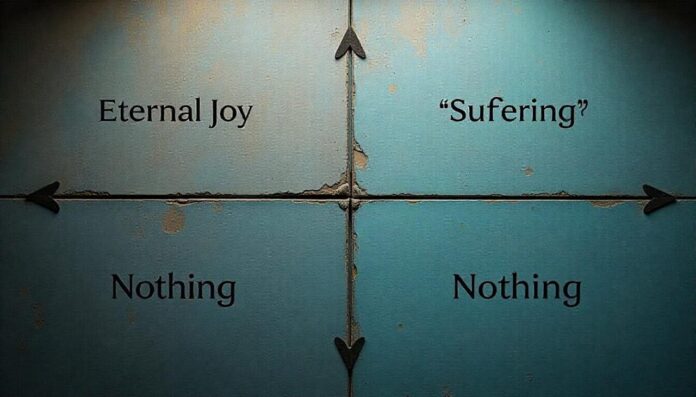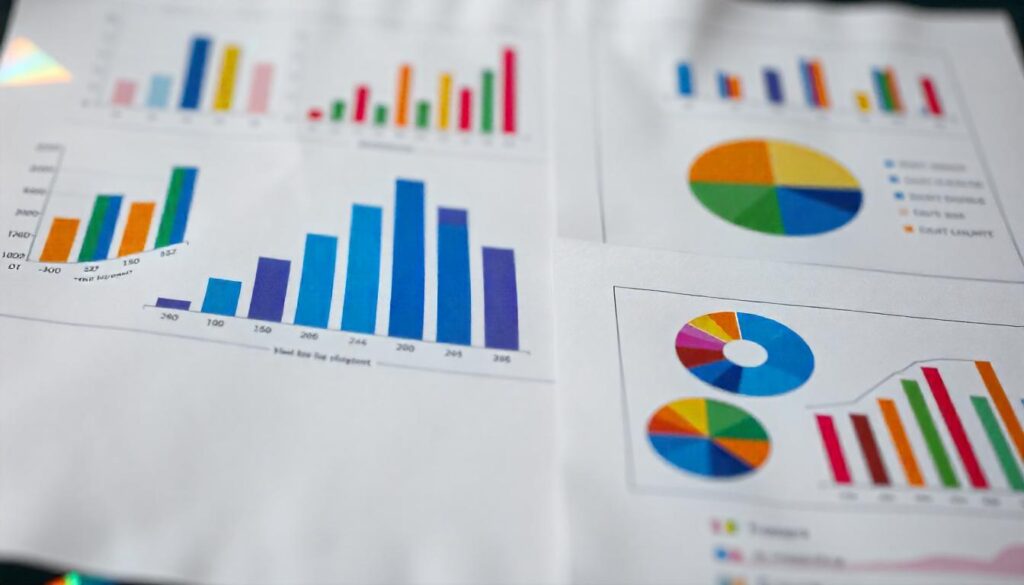
Ever been to Vegas? Try to picture this: you walk into some kind of cosmic casino. No slot machines. No poker tables. Just a big roulette wheel. On one side: belief in God. On the other – atheism.
The stakes? Heaven or hell. Well, welcome to Pascal’s Wager. Blaise Pascal, a 17th-century mathematician and philosopher, created this argument to challenge one of life’s biggest questions: Is it worth believing in God?
And Pascal’s approach isn’t about proving God exists. It’s a kind of smart betting system. He used logic and numbers to make his case.
It’s like Pascal was trying to turn faith into a no-brainer investment strategy. “Hey, why not hedge your bets on the afterlife?” he seemed to be saying.
“It’s the ultimate low-risk, high-reward play!” He was basically telling people to treat their spiritual life like some kind of cosmic insurance policy.
It really is an interesting argument, thought experiment, and idea worth exploring. And those kinds of ideas we like exploring the most here – at CuriousMatrix.com.
So, let’s begin.
Interesting fact: Pascal came up with this idea while suffering from a toothache.
What Is Pascal’s Wager?

Pascal’s Wager is very much different from other philosophical arguments. It doesn’t try to prove or disprove God’s existence.
Instead, it asks, What’s the safest choice? If you think of life as a game, believing in God is the safest bet.
As mentioned at the beginning, imagine a casino. One table has an unusual game called “GodLife”.
Here are your options:
- Bet on God existing. If you’re right, you win eternal happiness. If you’re wrong, you lose very little. You might spend time in church. You could tithe a bit of your income. But that’s small potatoes compared to the potential jackpot.
- Bet on God not existing. If you’re wrong, you face eternal suffering. If you’re right, your reward is limited (only) to pleasures here on Earth.
Pascal believed this logic made the choice obvious. The potential rewards are infinite.
And the risks of disbelief are just too high. It’s less about faith and more about playing the odds.
So, let’s break down the odds.
Interesting fact: Blaise Pascal was a devout Catholic but struggled with faith for much of his life. His wager was partly his own way of reasoning through doubt.
The Math of Belief

Let’s first make it rather simple and then we’ll delve into more complicated probabilities and math.
Namely, Pascal thought about faith like a mathematician. He used probabilities to show why belief makes sense.
Here’s a simple table:
| Belief | God Exists | God Doesn’t Exist |
| Believe in God | Infinite gain | Minimal loss |
| Don’t Believe | Infinite loss | Minimal gain |
Ok, that’s simple enough (from math and probabilities perspective), but let’s make it a bit more complicated. Because why not?
Note: if you prefer not to read different math calculations you can skip directly to the Objections and Strange Scenarios part of this article.
Interesting fact: Pascal never actually published his wager. It was found in his notes after his death, scribbled alongside doodles of probability curves.
Calculations and Probabilities

We could say that Pascal’s Wager assumes four possible outcomes based on two decisions: belief vs. disbelief and whether God exists or doesn’t.
For simplicity, let’s assign these probabilities and payoffs:
- Probability that God exists = P(G).
- Probability that God doesn’t exist = 1−P(G).
- Payoff for eternal happiness (if God exists and you believe) = ∞ (infinite value).
- Payoff for eternal suffering (if God exists and you don’t believe) = −∞ (negative infinite value).
- Finite payoff for belief or disbelief if God doesn’t exist = some finite utility, e.g., UB (utility of believing) or UD (utility of disbelief).
Now calculate the expected value of each choice.
Expected Value of Believing in God
EVBelieve= P(G) x (∞) + (1−P(G)) x UB
- If P(G) > 0, even the tiniest chance of God existing makes the ∞(infinity) term dominate the calculation.
- Example: If P(G)=0.01, the calculation still results in infinite EV (expected value) for belief.
Thus:
EVBelieve = ∞
Ok, so far so good. Let’s see the other option.
Expected Value of Not Believing in God
EVDisbelieve = P(G) x (−∞) + (1−P(G)) x UD
- If P(G) > 0, the negative infinite term dominates the equation.
- Example: If P(G) = 0.01, the risk of infinite loss outweighs any finite gain from not believing.
Thus:
EVDisbelieve = −∞
Adding Finite Payoffs to the Model
Let’s say belief requires sacrifices, like giving up certain pleasures or resources (CB), while disbelief offers more earthly pleasures (UD).
Adjusted equations:
- Belief:
- EVBelieve = P(G) x (∞) + (1−P(G)) x (UB − CB)
- Disbelief:
- EVDisbelieve = P(G) x (−∞) + (1−P(G)) x UD
Even when accounting for the costs of belief, the infinite payoff from eternal happiness dominates if P(G) > 0.
Ok, let’s add some assumptions calculations…
Thought Experiment: Assigning Probabilities

A critic might argue that assigning P(G) is impossible. But let’s explore three scenarios:
- Pessimistic Assumption:
Assign P(G) = 0.00001
- EVBelieve = 0.00001 x ∞ + 0.99999 x UB = ∞
- EVDisbelieve = 0.00001 x (−∞) + 0.99999 x UD = −∞
- Neutral Assumption:
Assign P(G) = 0.5
- Belief: 0.5 x ∞ + 0.5 x UB = ∞
- Disbelief: 0.5 x (−∞) + 0.5 x UD = −∞
- Optimistic Assumption:
Assign P(G) = 0.9
- Results remain dominated by infinity or negative infinity.
So basically all calculations lead to the same result (based on the previous decision, of course).
Now, let’s get back to the core topic and explain it a bit further, and perhaps with some strange scenarios.
Interesting fact: Blaise Pascal invented one of the first mechanical calculators.
Objections and Strange Scenarios

As mentioned, not everyone agrees with Pascal’s Wager. Critics say it’s too simple. It assumes there’s only one God. But what if there are many gods? Or what if the true God rewards doubters?
Here’s a strange thought: Imagine a pantheon of gods, each with different rules. Some gods reward believers. Others punish them.
Some value kindness, while others want obedience. Picking the right god becomes a cosmic guessing game. How do you choose?
And what about moral atheists? Picture someone who doesn’t believe in God but lives a virtuous life.
They rescue animals, help strangers, and tell the truth. Shouldn’t their good deeds count for something? Pascal’s Wager suggests that belief alone matters.
This raises big questions.
Interesting fact: Some philosophers have jokingly proposed a "Reverse Pascal's Wager," arguing that an all-knowing God would respect honest disbelief more than opportunistic faith.
Alternate Universes and the Multiverse Question

And what if there are infinite universes? Each one could have different gods or rules. How does Pascal’s Wager hold up in a multiverse?
Well, it doesn’t.
Imagine a god who rewards people for silly things—like guessing their favorite color. You spend your life worshipping, only to find out you should’ve chosen blue.
In a multiverse, betting becomes even trickier. There are endless possibilities, and picking the right god feels impossible.
The Tech Singularity Wager

Some futurists argue that we should invest heavily in artificial intelligence research using Pascal’s Wager-style logic.
The potential downside (wasting some money) is nothing compared to the possible upside (creating a benevolent AI god that solves all our problems).
We’ve discussed a similar hypothesis in our ultra-comprehensive guide on Roko’s Basilisk.
This also goes hand in hand with the Simulation Hypothesis.
The Simulation Wager

Some people use Pascal’s Wager to argue we should act as if the simulation hypothesis is true.
The reasoning?
Well if we’re not in a simulation, no harm done. But if we are, maybe the simulators will reward us for figuring it out.
For example, imagine finding out your whole life was a cosmic version of The Sims, but you get a prize for guessing correctly.
In one way it would be like the ultimate Easter egg hunt.
Final Thoughts on the BIG GAMBLE

And so, the wager doesn’t answer everything. It’s not meant to. It’s actually a starting point—a way to start a conversation.
Whether you believe in God, doubt, or feel unsure, Pascal’s Wager in some way challenges you to consider the ultimate gamble.
Now, of course, we could go on and on with different thought experiments and hypotheses, because Pascal’s Wager could be applied in many different fields of life.
But let’s leave it here.
As Kanye West once said when he won a Grammy: “Everybody wanted to know what I would do if I didn’t win… I guess we’ll never know!”
And yes, indeed, we’ll never know the true consequences of the big Pascal’s Wager. Or we will know but we will not be able to communicate the consequences back to this world.
And finally: Did we just place Kanye West and Blaise Pascal in the same article?
Yes, we did…



























